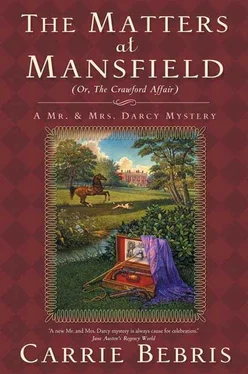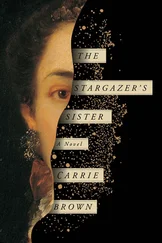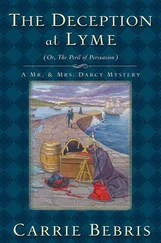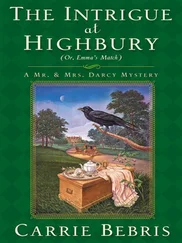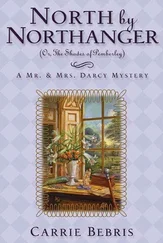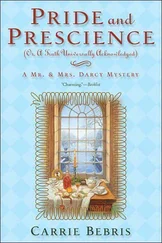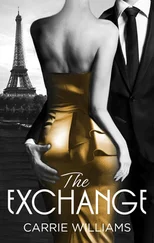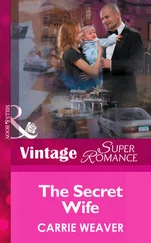“I am impervious to wiles.”
“We shall determine that later. Do you think her husband equally resolute? Mr. Rushworth might have purchased the weapon for her, before she left him.”
“Do not most women prefer jewelry?”
“We witnessed how highly Maria Rushworth valued gifts of jewelry, at least from Mr. Crawford.” Elizabeth was thoughtful a moment. “Maybe the pistol came from him, and those earrings were not the only gift she so dramatically returned to him that day.”
“She shot him with the pistol and then dropped it at his side?”
“That would explain why it was left behind. A pistol is not the most romantic gift, though, and Mr. Crawford seems like someone who would be very conscious of creating the proper impression.”
“Perhaps it was indeed Mr. Crawford’s own pistol, purchased for himself when he and Mrs. Rushworth eloped.”
“In anticipation of a duel?”
“What do you know of duels?”
She shrugged. “Someone in a novel has to defend the heroine’s honor. And Mr. Crawford has compromised more than his share of ladies.”
“More than his share? I did not realize gentlemen received an allowance. ’Tis a shame no one told me while I was still a bachelor. Or does the allotment apply only to rakes?”
“Mr. Crawford was not a rake, precisely. He did not conduct his life as a gentleman ought, but he was no Mr. Wickham. Though he toyed with women’s affections, he did not seem to do so out of predatory intent. He was simply vain and foolish and insensible to the damage he wrought.”
“Your defense of him surprises me.”
“He is dead; I can afford to be generous. But apparently one of the women he wronged, or a male protector, was less forgiving. Pray describe the pistol further.”
“It is smaller than a typical dueling pistol,” he said, “but could certainly serve as one. It was made by Mortimer, one of the best gunsmiths in England, and exhibits the finest technical and artistic features of the gunmaker’s craft. It is by far the most superior pistol I have ever held.”
“Just how many pistols have you held? Perhaps I ought to ask what you know of dueling.”
“As much as most gentlemen.” He had never been called upon to defend his own honor, and hoped he never would. The closest he had come was during his Cambridge years, when a friend who had issued a challenge asked him to serve as his second. Darcy and the defender’s second had tried their hardest to mediate the disagreement before the primaries met on the field, but their efforts had been in vain. His friend had died — a pointless waste of a promising life — and all of those involved had been fortunate to escape prosecution.
“An impressive parry,” she said, “but I grant you only temporary reprieve from answering my question. Meanwhile, let us return to the matter at hand. You believe the shooting patch you found in the grass came from the pistol beside Mr. Crawford?”
“It is so fine a cloth that I cannot imagine someone’s using it to load an ordinary hunting rifle. And it shares a bird motif with the pistol’s engravings.”
“Might I see it?”
He withdrew the silk from his pocket and handed it to her.
“Damask,” she said. “Our gunman has good taste. And it is indeed an interesting pattern — a departure from the more common paisleys and florals.” She turned it over and examined the abrasions. “The gunpowder creates an intriguing design of its own — like a black sun, only with few rays. What are these thin black lines coming out from the center?”
“I am curious about them myself. A rifle creates such marks on shot patches, but there are usually more of them — six or seven. They are caused by spiraled cuts within the barrel — rifling — whence the weapon derives its name. But this patch has only three such marks. And if, as I believe, it was fired from the pistol found with Mr. Crawford, that weapon has a smooth bore, and therefore would leave no marks.”
“So this patch might not have come from the pistol after all?”
“Please do not dismantle my investigation before it has begun. Sir Thomas is doing a fair enough job of that as it is, and I have little time in which to formulate a plausible theory of events.”
“Why not show the patch to Colonel Fitzwilliam? Perhaps Sir Thomas would also allow him to examine the pistol. As a military man, the colonel no doubt possesses extensive knowledge of firearms. And as he carries pistols himself, he is certainly very experienced with them.”
He hesitated. “That is my fear.”
Her eyes widened as she realized his meaning. “Darcy, surely you do not believe — Oh! But he even spoke of dueling with Mr. Crawford, just before he left in pursuit of him.”
That fact troubled Darcy greatly. “He assured me, after the horse returned riderless, that he had not killed Mr. Crawford. I trust his word.” A tiny point of doubt yet pricked him, but he did his best to suppress it. “Colonel Fitzwilliam is more than capable of punishing Mr. Crawford on a field of honor, but he would have done it in just that manner — honorably. Gentlemen’s duels are not ambushes; they are civilized affairs that adhere to strict protocol. There are rules. There are witnesses in attendance to ensure those rules are followed. Whom would Colonel Fitzwilliam choose as his second, if not me?”
“Dueling is illegal. Perhaps he deliberately excluded you from the proceedings so as not to compromise you.”
It would be just like his cousin to take all of the risk upon himself, sparing to whatever extent he could all other family members from any scandal that resulted from his actions. He could have found another, more disinterested, second. But one fact exonerated Colonel Fitzwilliam, in Darcy’s mind, as decisively as possible without actually entering another person’s thoughts and heart.
“Even had he shot Mr. Crawford in secret, my cousin could not have left his remains exposed for days to the desecration of wildlife and weather. To do so would violate every principle that defines him.” Even now, as the body was being examined, the memory of it disgusted Darcy. Whoever had dispatched Mr. Crawford was devoid of conscience. “Formal dueling etiquette dictates the presence of a surgeon to attend to injuries. In the absence of one, Colonel Fitzwilliam would, at the very least, have contrived a means of ensuring the body was discovered before this morning, and would have been unable, in the interim, to look me in the eye and converse with me as freely as he has, knowing that he had left Mr. Crawford in such a state. Though words uttered in a heated moment cast suspicion upon him, his character as demonstrated over the course of three decades exculpates him.”
“I am relieved by your conviction of his innocence, for I did not want to consider him capable of such cold-blooded conduct. Yet if we acquit Colonel Fitzwilliam, we are back to Meg, Maria Rushworth, and Sir Thomas as our chief suspects. Setting aside the women for now, that leaves Sir Thomas. Did he strike you as someone foolish enough to shoot a man, even in a duel, on his own estate, then leave his body lying around for five days until the gamekeeper discovered it?”
“I cannot say that he did.”
“Then we need more gentlemen in our pool of candidates. I nominate Mr. Rushworth, the cuckolded husband. Now, there is a man with just cause for retribution. What do we know of him?”
“Very little beyond the fact that he has initiated divorce proceedings against his wife.”
“Yes, Maria Rushworth referred to a crim con suit while arguing with Mr. Crawford.”
Darcy’s brows rose. “ ‘ Crim con’?” Before petitioning Parliament for a full divorce, the husband of an unfaithful wife first had to win a civil suit against her lover for their adulterous association, legally and euphemistically known as “criminal conversation.” Darcy was amused by Elizabeth’s use of the abbreviated term employed by members of the legal profession — and also in the salacious newspaper accounts and trial transcripts published to feed the public’s appetite for gossip. “I had no idea you were so conversant in legal jargon.”
Читать дальше
